Related Research Articles

Neville Thomas Bonner AO was an Australian politician, and the first Aboriginal Australian to become a member of the Parliament of Australia. He was appointed by the Queensland Parliament to fill a casual vacancy in the representation of Queensland in the Senate, and later became the first Indigenous Australian to be elected to the parliament by popular vote. Neville Bonner was an elder of the Jagera people.

Central Queensland is an imprecisely-defined geographical division of Queensland that centres on the eastern coast, around the Tropic of Capricorn. Its major regional centre is Rockhampton. The region extends from the Capricorn Coast west to the Central Highlands at Emerald, north to the Mackay Regional Council southern boundary, and south to Gladstone. The region is also known as Capricornia. It is one of Australia's main coal exporting regions.
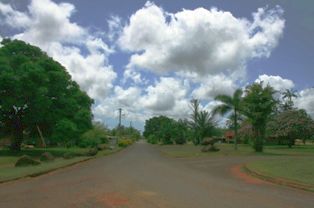
Hope Vale is a town within the Aboriginal Shire of Hope Vale and a coastal locality split between the Aboriginal Shire of Hope Vale and the Shire of Cook, both in Queensland, Australia. It is an Aboriginal community. In the 2016 census, the locality of Hope Vale had a population of 1,015 people.
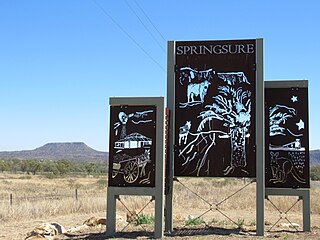
Springsure is a town and a locality in the Central Highlands Region, Queensland, Australia. It is situated 66 kilometres (41 mi) south of Emerald, at the southern end of the Gregory Highway, and at the northern end of the Dawson Highway. Springsure is 765 kilometres (475 mi) northwest of Brisbane. In the 2021 census, the locality of Springsure had a population of 950 people.

Duaringa is a town in the Central Highlands Region and a locality split between the Central Highlands Region and the Aboriginal Shire of Woorabinda in Central Queensland, Australia. In the 2021 census, Duaringa had a population of 262 people.
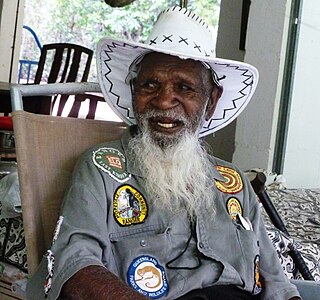
Tommy George Sr. was an elder of the Kuku Thaypan clan on Cape York Peninsula, Queensland, Australia. He was the last fluent Awu Laya speaker.
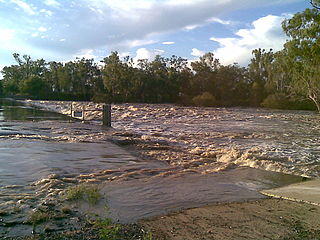
The Dawson River is a river in Central Queensland, Australia.

Woorabinda is a rural town and locality in the Aboriginal Shire of Woorabinda, Queensland, Australia. In the 2016 census, Woorabinda had a population of 962 people. It is an Aboriginal community.
Richard Laurence "Darby" McCarthy was an Australian jockey.
Lionel Fogarty, also published as Lionel Lacey, is an Indigenous Australian poet and political activist.

The Shire of Duaringa was a local government area in the Capricornia region of Queensland, Australia. Duaringa Shire covered an area of 18,201 square kilometres and had a population of 6,744 according to the 2006 census. On 15 March 2008 the shires of Duaringa, Emerald, Bauhinia and Peak Downs were amalgamated to form the Central Highlands Region.
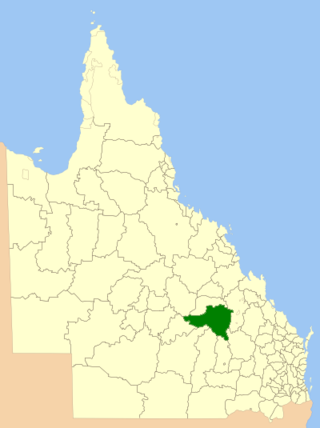
The Shire of Bauhinia was a local government area in Central Queensland, Queensland, Australia. The Shire, administered from the town of Springsure, covered an area of 23,649.6 square kilometres (9,131.2 sq mi), and existed as a local government entity from 1879 until 2008, when it was amalgamated with the Shires of Duaringa, Emerald and Peak Downs to form the Central Highlands Region.

Samuel William Watson, also known as Sammy Watson Jnr, was an Aboriginal Australian activist from the 1970s, who in later life stood as a Socialist Alliance candidate. He is known for being a co-founder of the Australian Black Panther Party in 1971/2. Through work at the Brisbane Aboriginal Legal Service in the early 1990s, Watson was involved in implementing the findings of the Royal Commission into Aboriginal Deaths in Custody. From 2009 was deputy director at the Aboriginal and Torres Strait Islander Studies Unit at the University of Queensland.

The Aboriginal Shire of Woorabinda is a local government area in Central Queensland, Australia.

The Jagera people, also written Yagarr, Yaggera, and other variants, are the Australian First Nations people who speak the Yuggera language. The Yuggera language which encompasses a number of dialects was spoken by the traditional owners of the territories from Moreton Bay to the base of the Toowoomba ranges including the city of Brisbane.
Bidjara, also spelt Bidyara or Pitjara, is an Australian Aboriginal language. In 1980, it was spoken by twenty elders in Queensland between the towns of Tambo and Augathella, or the Warrego and Langlo Rivers. There are many dialects of the language, including Gayiri and Gunggari. Some of them are being revitalised and is being taught in local schools in the region.
Eric Deeral was an Australian politician who was the second Australian Aboriginal person elected to an Australian parliament and the first to a state parliament.
Miiesha is an Australian singer-songwriter from the Aboriginal community of Woorabinda, Queensland. She was the recipient of New Talent of the Year at the 2020 National Indigenous Music Awards and won the ARIA Award for Best Soul/R&B Release at the 2020 ARIA Music Awards.
Rita Huggins (1921–1996) was an Australian Indigenous woman and activist.

Patricia O'Connor is an Australian Aboriginal elder of the Yugambeh people. She is known for her work in reviving the Yugambeh language and opening the Yugambeh Museum. In 2014 she received the NAIDOC Award for Female Elder of the Year, and in 2019 she was named a Queensland Great.
References
- 1 2 3 Harris, Julia; Roberts, Alice (10 September 2010). "Elder reveals secrets of Sacred site". Stateline . Australian Broadcasting Corporation. Archived from the original on 27 October 2010. Retrieved 18 June 2023.
- 1 2 3 4 5 6 7 8 9 10 11 12 "Fred Conway". Wild Magazine. 16 December 2014. Retrieved 18 June 2023.
- 1 2 3 "People - creating opportunities for everyone: Indigenous ranger's cultural quest". The Queensland Plan - Queenslanders' 30-year vision. Queensland Governement. 7 April 2016. Retrieved 18 June 2023.
- 1 2 Harris, Julia; Roberts, Alice (7 September 2010). "Fred Conway walks and talks the Gorge". ABC Local . Australian Broadcasting Corporation.
- ↑ Potts, David S (2 August 2006). "The Art is Gorge-ous!". The Sydney Morning Herald . Retrieved 18 June 2023.
- 1 2 3 Stanley, Di (1 August 2014). "Central Queensland elder recognised for great work". CQ News . Retrieved 18 June 2023.
- ↑ Stokes, Aden (7 July 2020). "Shock diagnosis: 'I thought that was the end of me'". The Morning Bulletin . Retrieved 18 June 2023.
- 1 2 3 4 Semmler, Erin (9 February 2022). "Queensland cancer battler Fred Conway wants to close the healthcare gap". ABC News . Retrieved 18 June 2023.
- ↑ "2014 recipients: Fred Conway". Queensland Greats Awards . Queensland Government. 2014. Retrieved 18 June 2023.
- ↑ "Award: 2005740". Australian Honours Search Facility . Department of the Prime Minister and Cabinet. 26 January 2020. Retrieved 18 June 2023.
- ↑ Smith, Kaitlyn (20 July 2020). "'I cried': Huge honour awarded to humble Fred". The Morning Bulletin. Retrieved 18 June 2023.